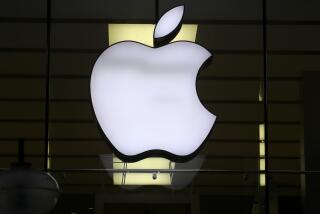Apple Aims to Play on IPod Success With $99 Model
- Share via
SAN FRANCISCO — Apple Computer Inc. on Tuesday unveiled cheaper models of its iPod music player in a bid to use the wildly popular device to attract customers to its computers.
In addition to a $99 iPod, Apple announced a petite, $499 version of its Macintosh personal computer to compete more directly against PC giants Dell Inc. and Hewlett-Packard Co.
“We want to price this Mac so that people who are thinking of switching have no excuses,” Apple Chief Executive Steve Jobs said at the annual MacWorld conference here.
Both products were widely expected and come as Apple attempts to leverage the success of iPod and the iTunes Music Store. Although Apple’s share of the PC market has dwindled to less than 2%, it is the top seller of digital music players.
Jobs said Apple sold 4.5 million iPods in the fourth quarter of last year, more than double the number in the third quarter and more than 40% of all iPods sold since the devices debuted in October 2001.
Wall Street, though, expected Apple to sell even more. After Jobs announced the sales figures, Apple shares fell, closing down $4.40, or 6.4%, at $64.56 on Nasdaq.
“All indications were that [iPods] would be the hottest items for Christmas,” said Steven Lidberg, an analyst with Pacific Crest Securities. “That turned out to be true, but expectations probably got a little ahead of the actual business momentum.”
When Apple reports its fiscal first-quarter earnings today, the company is expected to announce that iPod helped more than triple per-share earnings over the same period a year earlier. Apple shares, likewise, have tripled since February.
The new iPod shuffle starts at $99, but has considerably less storage and fewer features than the $249 iPod mini, previously Apple’s cheapest model. About the size of a pack of gum, the iPod shuffle holds 120 to 240 songs, compared with the 15,000-song capacity of top-end iPods, which sell for $599.
Rather than build the new players around more expensive hard disk drives, Apple opted to use the same sort of flash memory used in cellphones to power the iPod shuffle.
Analysts say the new models extend the iPod brand by moving the stylish device into mass-market pricing. “It’s not really a competitor to the iPod mini class,” said NPD Group analyst Stephen Baker, “so it won’t cannibalize other iPods.”
Some who recently bought iPods agreed.
Florida lawyer Donna Goldman said she would have to see the new iPods to judge them. But, she said, her 12-year-old daughter “wants to be seen to have the nice one. If your kid would say, ‘Why did you get me the junky one?,’ that would be a problem.”
Dan Lopresti was “a little annoyed” by the new offerings landing so soon after Christmas, but the Pennsylvania university professor said the stripped-down iPod “strikes me as being a little hard to manage. I don’t think I’d be excited.”
Competitors blasted the iPod shuffle’s sub-$100 price tag as little more than marketing sleight of hand.
“It’s like, ‘batteries not included,’ ” said Dan Torres, vice president of product marketing for Rio Audio, which makes flash memory players. He noted that Apple charged $20 each for a battery extender, an armband and a hard case to put around the iPod shuffle’s somewhat fragile plastic. None of those, Torres noted, are needed with Rio’s products -- which start at $115, run on conventional batteries and come with armbands.
“Add it all in and you’re well over our price,” Torres said.
Demonstrating the importance of the iPod brand, Apple adapted the name of the iPod mini for its $499 Mac mini, which it hopes will attract computer users frustrated by PCs running Microsoft Corp.’s ubiquitous Windows operating system.
Dubbed the “headless” Mac by wags because of its lack of a monitor, the Mac mini is a simple white box 6.5 inches wide by 2 inches tall with a single slot for CDs and DVDs.
“The announcement of a $500 Mac is a critical component in Apple accelerating the iPod halo effect, which should be positive for Apple throughout 2005 and beyond,” said Piper Jaffray analyst Gene Munster.
But other analysts were skeptical the new computer would entice enough people to defect from Windows. It’s still more expensive than comparably equipped PC bundles, which include monitors.
“We’ve been recommending to Apple for a long time that they need a lower-end desktop, but I don’t think they’ll be able to get more switchers from Windows PCs,” said Mika Kitagawa, a hardware analyst with technology market researcher Gartner Inc. “But it’s a good spot that Apple wasn’t in, and the product is really nice.”
*
Times staff writer Joseph Menn contributed to this report.






